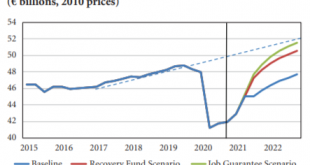Lekha Chakraborty(Professor, NIPFP, and Member of Governing Board, International Institute of Public Finance, Munich) Climate change is about risks and uncertainty. How well the monetary policy stance can incorporate such risks and uncertainties is questioned by many economists. There is a broad consensus among economists that fiscal policy is capable of dealing with the climate crisis but monetary policy is not, due to the latter’s lack of tools. It is widely acknowledged that public...
Read More »Women’s Economic Empowerment and Control over Time in Sub-Saharan Africa (Nov 1-2)
Biographies Patricia Blankson Akakpo is a Programme Manager of the Network for Women’s Rights in Ghana (NETRIGHT) – a women’s rights and economic justice advocacy network. Patricia holds a BA in political science with philosophy; MA in development studies with specialization in human resources and employment; and gender studies; and a diploma in development leadership. Patricia joined NETRIGHT in 2003. She has over twenty-five years of experience in gender and development in Ghana working...
Read More »Women’s Economic Empowerment and Control over Time in Sub-Saharan Africa (Nov 1-2)
Biographies Patricia Blankson Akakpo is a Programme Manager of the Network for Women’s Rights in Ghana (NETRIGHT) – a women’s rights and economic justice advocacy network. Patricia holds a BA in political science with philosophy; MA in development studies with specialization in human resources and employment; and gender studies; and a diploma in development leadership. Patricia joined NETRIGHT in 2003. She has over twenty-five years of experience in gender and development in Ghana working...
Read More »Podcast on Gender Budgeting
Michael Stephens | June 18, 2021 Research Associate Lekha Chakraborty, recently chosen to join the governing council of the International Institute for Public Finance, was interviewed for an Onmanorama podcast on the question of gender budgeting and the advantages of centering care work. Chakraborty argues policymakers in India should prioritize integrating a comprehensive care economy policy package in macroeconomic...
Read More »Podcast on Gender Budgeting
Michael Stephens | June 18, 2021 Research Associate Lekha Chakraborty, recently chosen to join the governing council of the International Institute for Public Finance, was interviewed for an Onmanorama podcast on the question of gender budgeting and the advantages of centering care work. Chakraborty argues policymakers in India should prioritize integrating a comprehensive care economy policy package in macroeconomic...
Read More »Podcast on Gender Budgeting
Michael Stephens | June 18, 2021 Research Associate Lekha Chakraborty, recently chosen to join the governing council of the International Institute for Public Finance, was interviewed for an Onmanorama podcast on the question of gender budgeting and the advantages of centering care work. Chakraborty argues policymakers in India should prioritize integrating a comprehensive care economy policy package in macroeconomic...
Read More »The Minsky Conference Returns
Participants Lakshman Achuthan, Cofounder, Economic Cycle Research Institute Binyamin Appelbaum, Editorial Board Member, New York Times Robert Barbera, Director, J.H.U. Center for Financial Economics; Economics Department Fellow, The Johns Hopkins University Peter Coy, Economics Editor, Bloomberg Businessweek Charles Evans, President and CEO, Federal Reserve Bank of Chicago Jason Furman, Aetna Professor of the Practice of Economic Policy, Harvard Kennedy School (HKS) and the Department of...
Read More »The Minsky Conference Returns
Participants Lakshman Achuthan, Cofounder, Economic Cycle Research Institute Binyamin Appelbaum, Editorial Board Member, New York Times Robert Barbera, Director, J.H.U. Center for Financial Economics; Economics Department Fellow, The Johns Hopkins University Peter Coy, Economics Editor, Bloomberg Businessweek Charles Evans, President and CEO, Federal Reserve Bank of Chicago Jason Furman, Aetna Professor of the Practice of Economic Policy, Harvard Kennedy School (HKS) and the Department of...
Read More »The Minsky Conference Returns
Participants Lakshman Achuthan, Cofounder, Economic Cycle Research Institute Binyamin Appelbaum, Editorial Board Member, New York Times Robert Barbera, Director, J.H.U. Center for Financial Economics; Economics Department Fellow, The Johns Hopkins University Peter Coy, Economics Editor, Bloomberg Businessweek Charles Evans, President and CEO, Federal Reserve Bank of Chicago Jason Furman, Aetna Professor of the Practice of Economic Policy, Harvard Kennedy School (HKS) and the Department of...
Read More »Direct Job Creation in Greece
Michael Stephens | April 28, 2021 Senior Scholar Rania Antonopoulos recently participated in a webinar for the European Trade Union Institute, during which she discussed the rationale behind and experience with the implementation of the “Kinofelis” direct job creation program—a limited job guarantee for Greece. Watch her presentation below (accompanying slides are here). The Levy Institute’s previous Strategic Analysis for...
Read More » Multiplier Effect
Multiplier Effect

